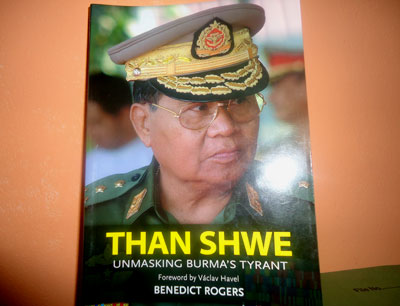A book ‘Than Shwe-Unmasking Burma’s Tyrant’, focusing on the life of the head of Burma’s military junta, Senior Gen. Than Shwe, was released in India ...
A book ‘Than Shwe-Unmasking Burma’s Tyrant’, focusing on the life of the head of Burma’s military junta, Senior Gen. Than Shwe, was released in India on November 16.
 The book was launched on Tuesday in New Delhi, the capital of India, by the author, Benedict Rogers, who is Deputy Chairman of the Conservative Party Human Rights Commission (United Kingdom), and London based East Asia Team Leader of Christian Solidarity Worldwide (CSW).
The book was launched on Tuesday in New Delhi, the capital of India, by the author, Benedict Rogers, who is Deputy Chairman of the Conservative Party Human Rights Commission (United Kingdom), and London based East Asia Team Leader of Christian Solidarity Worldwide (CSW).
“I don’t think he (Than Shwe) will like it very much,” the author said, adding the book says a lot of negative things about Burma’s military dictator.
He told the Thailand-based Kachin News Group (KNG) that the main purpose of writing this book was to reveal details of the situation in Burma in the hope that the international community will be more aware of the suffering of the people of Burma, and understand more about the nature of the regime and Than Shwe.
“If we want to help Burma, we need to understand the regime and Than Shwe,” he said.
Rogers, who has been a Burma specialist for more than 10 years, explained he collected the information about Than Shwe from three main sources.
The first source is people who defected from the Burmese Army, who knew Than Shwe personally, as well as others who took part in military training with the general.
The second source is different international diplomats, including Tan Sri Razali Ismail, the United Nation Special Rapporteur of Burma, from 2000-2008, as well as former ambassadors who have met Than Shwe.
The final source is people from Burma who know what it is like to live under Than Shwe’s rule, whether they ever met him or not, Rogers said.
“I feel very sad for him. He has to accept responsibility for the situation happening in Burma today,” said Rogers, who has been travelling frequently to the ethnic areas, and the Thailand, China and India borders.
“He is guilty of crimes against humanity, and I hope justice will be done,” said Rogers.
He also talked about the huge difference between Than Shwe and Burma’s pro-democracy leader, Aung San Suu Kyi, in that the military chief does not believe in democracy and human rights, and has spent most of his life in the military. However Suu Kyi, is very well educated and sophisticated, has lots of international experience, and she believes in democracy and human rights.
He said the information he has received from Burmese people has led him to conclude the results of Burma’s recent election are “completely unacceptable, and that is a shame.”
“The international community should not recognize the election, and maintain the pressure on the regime,” he said.
“If there is meaningful dialogue, which includes the ethnic people, that will be a positive political process in Burma,” he said.



